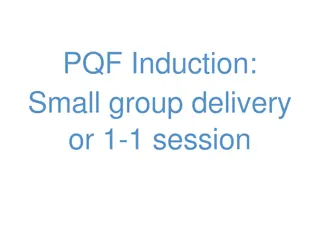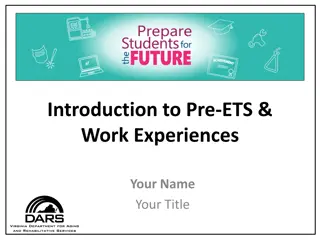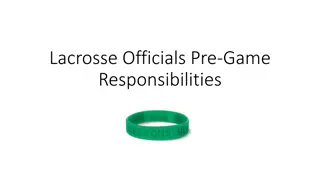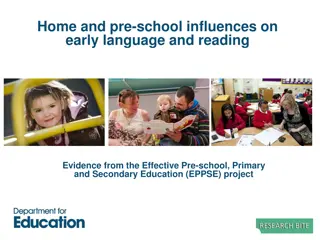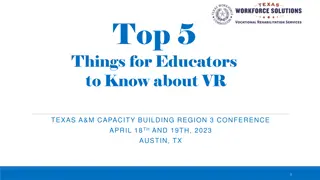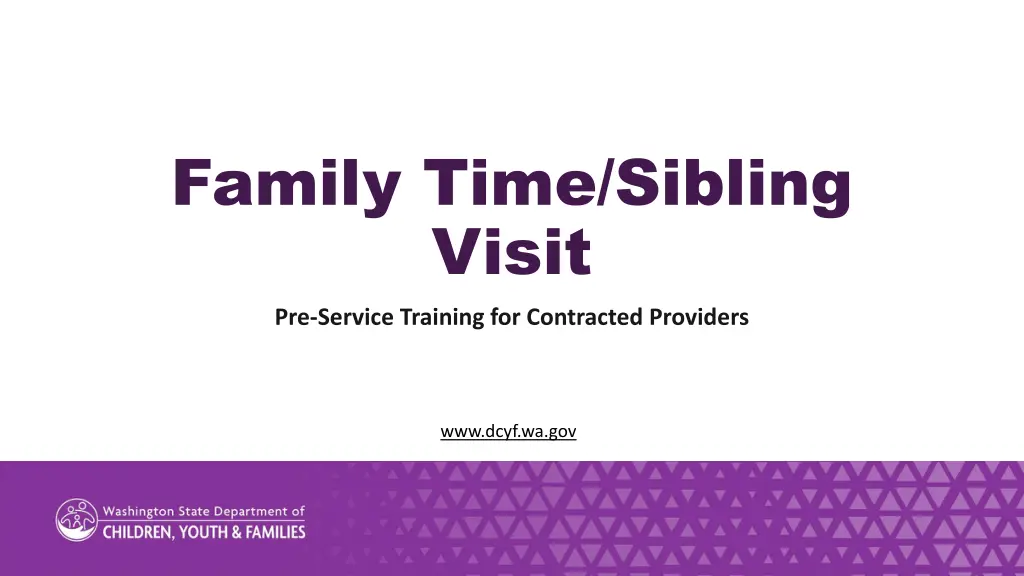
Understanding Family Time and Sibling Visits in Child Welfare Services
Discover the importance of family time and structured sibling visits in maintaining crucial connections for children in out-of-home care facilitated by contracted providers. Learn about the roles, responsibilities, and goals associated with these services, as well as how to set up and manage visitations effectively while prioritizing safety and well-being.
Download Presentation

Please find below an Image/Link to download the presentation.
The content on the website is provided AS IS for your information and personal use only. It may not be sold, licensed, or shared on other websites without obtaining consent from the author. If you encounter any issues during the download, it is possible that the publisher has removed the file from their server.
You are allowed to download the files provided on this website for personal or commercial use, subject to the condition that they are used lawfully. All files are the property of their respective owners.
The content on the website is provided AS IS for your information and personal use only. It may not be sold, licensed, or shared on other websites without obtaining consent from the author.
E N D
Presentation Transcript
Family Time/Sibling Visit Pre-Service Training for Contracted Providers www.dcyf.wa.gov www.dcyf.wa.gov 1
Training Goals By the end of this training, you will understand: The purpose of family time/sibling visits The levels of supervision The roles and responsibilities of the parent, DCYF SSS, family time/sibling visit service worker and contracted agency supervisor How to set up a family time/sibling visit based on the information in the referral When to consider intervening or ending a family time/sibling visit early How to write reports using behaviorally specific language. How to communicate with DCYF SSS and caregivers The resources available to support you Updated Date: October 1, 2023 Child Welfare Programs Division Approved for distribution by Caitlin O Hea Family Time Program Manager 2 www.dcyf.wa.gov
What Are Contracted Family Time/Sibling Visit Services? Due to safety concerns, children are placed in out of home care through DCYF. In these situations, DCYF may ask a contracted provider to facilitate family time/sibling visit so the family can safely interact with one another. Updated Date: October 1, 2023 Child Welfare Programs Division Approved for distribution by Caitlin O Hea Family Time Program Manager 3 www.dcyf.wa.gov
Why Are Family Time/Sibling Visits Important? Frequent and consistent family time are crucial to maintain appropriate connections between parents and their children separated by out of home placement. Structured sibling visits between siblings placed separately help maintain family bonds. Consistent, positive family time/sibling visits improve safety, permanency and well-being for children in foster care. Updated Date: October 1, 2023 Child Welfare Programs Division Approved for distribution by Caitlin O Hea Family Time Program Manager 4 www.dcyf.wa.gov
How are services provided? Service referrals are created by DCYF SSS. Service request are submitted to a contracted provider through a Sprout referral. Referrals are assigned to a contracted agency and not individual Visit Service workers. The contracted agency determines who is assigned the referral. Any changes to a referral need to be documented in an updated referral in Sprout. Updated Date: October 1, 2023 Child Welfare Programs Division Approved for distribution by Caitlin O Hea Family Time Program Manager 5 www.dcyf.wa.gov
Types of Family Time/Sibling Visit Service Requests Emergent 72-Hour Parent-Child (Supervised, Monitored, or Unsupervised/ Transport Only) Sibling (Sight and Sound, Sight or Sound, or Sight) Updated Date: October 1, 2023 Child Welfare Programs Division Approved for distribution by Caitlin O Hea Family Time Program Manager 6 www.dcyf.wa.gov
Emergent 72-Hour Visit A requirement for all youth being placed into care and custody. First visit must occur within 72 hours of entering DCYF care and custody. Only one contractor per a catchment area provides this service. Updated Date: October 1, 2023 Child Welfare Programs Division Approved for distribution by Caitlin O Hea Family Time Program Manager 7 www.dcyf.wa.gov
Levels of Supervision Family Time Supervised: The contractor s staff shall maintain line of sight and sound supervision of the child when in the presence of parents, including all parties to the visit and be within the immediate vicinity to provide instant intervention as needed during the family time/sibling visit. Monitored: The contractor requires the parent to be the primary caregiver during the visit. The contractor will remain on site to conduct periodical check-ins as identified in the referrals and intervene if needed. Unsupervised: The contractor is not responsible for any supervision or monitoring of the family time. The contractor is responsible for transporting child(ren) to and from agreed upon locations and leaves the child with the designated caregiver. Updated Date: October 1, 2023 Child Welfare Programs Division Approved for distribution by Caitlin O Hea Family Time Program Manager 8 www.dcyf.wa.gov
Levels of Supervision Sibling Visits Sight and Sound (Highest Level of Supervision): requires the service worker to maintain line of sight and sound supervision and be within the immediate vicinity to provide instant intervention to maintain positive interaction and play between siblings. Sight or Sound (Intermediate Level of Supervision): requires the Service Worker to maintain line of sight and/or sound supervision dependent upon the developmental needs or behavioral issues of the child(ren) and be available for direct intervention to maintain positive interaction and play between siblings. Sight (Least Restrictive Level of Supervision): requires the Service Worker to maintain line of sight supervision and be available for intervention as needed to maintain positive interaction and play between siblings. Original Date: Month XX, 20XX Revised Date: Month XX, 20XX 9 Division Approved for distribution by Name, Title www.dcyf.wa.gov
Roles and Responsibilities Parent DCYF Social Service Specialist Family Time Visit Service Worker Contracted Agency Caregivers Updated Date: October 1, 2023 Child Welfare Programs Division Approved for distribution by Caitlin O Hea Family Time Program Manager 10 www.dcyf.wa.gov
Role of the Parent Should: Should not: Meet the child's basic physical and well-being needs. Provide snacks/meals and activities during the family time/sibling visit. Redirect the child. Engage the child in an activity (read, play games). Give time outs or use other skills learned in DCYF provided parenting interventions. Explain to the child why their behavior was wrong and give a positive alternative. Be verbally or physically aggressive, threatening or demeaning to visit participants and/or providers. Engage in activities that do not include the child (phone, text). Use physical discipline (hitting, spanking, grabbing or shaking the child). Ignore potentially dangerous behaviors of the child. Ignore child s physical or well-being needs. Updated Date: October 1, 2023 Child Welfare Programs Division Approved for distribution by Caitlin O Hea Family Time Program Manager 11 www.dcyf.wa.gov
Role of the DCYF Social Service Specialist Provides all necessary information on referral. Authorizes initial referral and subsequent changes by sending updated referral. Updates the contracted agency with new relevant information likely in the form of an updated referral. Reviews all reports. Offers additional services to parents and caregivers to support family time/sibling visits. Addresses areas of concern with the parent and caregiver. Transports child to any new placement including when a child is returning home or changing placement. Conducts the final family time between parent and child upon termination of parental rights. Updated Date: October 1, 2023 Child Welfare Programs Division Approved for distribution by Caitlin O Hea Family Time Program Manager 12 www.dcyf.wa.gov
Role of Agency Admin/ Staff Supervisor Provides ongoing supervision at minimum every month. Ensures employees meet all training requirements to begin employment and as they continue with the agency. Reviews and approves all family time/sibling visit narratives, incident reports and other documentation before submission to DCYF. Maintains all reports in agency file. Immediately addresses the contractor s performance. Ensures accurate and appropriate billing Ensure appropriate referral assignment based on individual family need and contract requirements. Any exception needs to be in writing by Regional Lead or NA and reviewed every 90 days for any mileage exceptions. Updated Date: October 1, 2023 Child Welfare Programs Division Approved for distribution by Caitlin O Hea Family Time Program Manager 13 www.dcyf.wa.gov
Role of Program Manager Are responsible for reporting required data Quality Assurance activities are completed as required by the Statement of Work Training Requirements are met Expected to accomplish the following in providing case oversight on the following services. Expected Service Outcomes Trauma informed Updated Date: October 1, 2023 Child Welfare Programs Division Approved for distribution by Caitlin O Hea Family Time Program Manager 14 www.dcyf.wa.gov
Role of the Family Time/Sibling visit Service Worker Be on time. No personal cell phone use unless it is an emergency. Follow the family time/sibling visit referral requirements. Give the family your full attention during the family time/sibling visit. Supervise for child safety and well-being throughout the transport and family time/sibling visit period. Intervene or end visit if needed. This includes, but is not limited to ensuring positive interactions, bonding, trauma informed interventions, and/or de-escalation strategies as needed. Document interaction between the parent and child during the family time/sibling visit using the format prescribed by DCYF. Maintain professional boundaries. This includes remaining a neutral participant before, during and after visits. Communicate health and safety information about the child to the caregiver. Maintain confidentiality. Submit the family time/sibling visit narrative, Incident Report and No-show reports to staff supervisor. Ensure all contract expectations are followed including, but not limited to 75 mile to first pickup, workday, and timely reports are followed. Updated Date: October 1, 2023 Child Welfare Programs Division Approved for distribution by Caitlin O Hea Family Time Program Manager 15 www.dcyf.wa.gov
Role of the Caregiver Work with visit service worker to identify the best time for visit to ensure child is not missing school, doctors' appointments or other significant events. Communicate any additional information that the visit service worker needs, or the parent needs to have to make visit successful such as changes in dietary needs or preferences. Ensure a pick-up and drop-off plan is arranged. Updated Date: October 1, 2023 Child Welfare Programs Division Approved for distribution by Caitlin O Hea Family Time Program Manager 16 www.dcyf.wa.gov
Family Time/Sibling Visit Transportation Information Transportation Requirements: Follow all the Rules of the Road Car seats and seat belt laws: http://www.800bucklup.org/ No cell phones Hands Free Law: RCW 46.61.667 Child passenger restraints and penalties: RCW 46.61.687 Children unattended in vehicle: RCW 46.61.685 Speeding and maximum speed limits:RCW 46.61.400 Texting while driving: RCW 46.61.668 Do not transport any adults or unauthorized children. Do not transport a child to any other service. Get authorized caregiver s signatures at pick up and drop off of a child. Updated Date: October 1, 2023 Child Welfare Programs Division Approved for distribution by Caitlin O Hea Family Time Program Manager 17 www.dcyf.wa.gov
Family Time/Sibling Visit Location of Visit - Follow any requirements as outlined in the referral - Ensure the visit location allows for the appropriate level of supervision - Visit service worker cannot sign any consent forms for activities. - List of potential locations are on the DCYF contracted services website Contracted Services | Washington State Department of Children, Youth, and Families Updated Date: October 1, 2023 Child Welfare Programs Division Approved for distribution by Caitlin O Hea Family Time Program Manager 18 www.dcyf.wa.gov
Family Time/Sibling Visit Services with Evidence-Based Practice (EBP) Providers The contractor may be asked to provide services for a family receiving a therapeutic intervention during the family time/sibling visit, in these cases your role is to: Transport the child to and from the family time. EBP provider needs to be an approved visit participant(s). This time should be in addition to the Court ordered Family Time schedule and not in replacement of this time. Expectations of what is expected shall be clearly identified in the referral by the DCYF SSS. Visit Service Worker is expected to follow what is in the referral and not what is verbally told to them by EBP provider. If one agency is doing both services, the EBP and Family Time work needs to be done by two different agency staff/sub-contractor. Updated Date: October 1, 2023 Child Welfare Programs Division Approved for distribution by Caitlin O Hea Family Time Program Manager 19 www.dcyf.wa.gov
How to Set Up a Family Time/Sibling Visit Review, understand and follow the terms and conditions of the family time/sibling visit service contract. Review each referral for all of the necessary information. Determine the agency s ability to facilitate the family time/sibling visits. Complete Intake Process including contacting all visit participants and gathering required additional information such as medical needs, transportation plan, and any other safety information Assignment to service worker whose skills and abilities meet the request. Communicate with the assigned social worker about family time/sibling visit details. Sends the Provider Notification form to social worker. Notify all parties at least 24 hours in advance to confirm the first family time/sibling visit. Updated Date: October 1, 2023 Child Welfare Programs Division Approved for distribution by Caitlin O Hea Family Time Program Manager 20 www.dcyf.wa.gov
Scheduling Considerations Mealtime Nap or Bedtime School Time Appointment Time Activity Time Parent s Court Ordered Services Cultural Considerations Medication Administration Updated Date: October 1, 2023 Child Welfare Programs Division Approved for distribution by Caitlin O Hea Family Time Program Manager 21 www.dcyf.wa.gov
Family Time/Sibling Visit Preparation Checklist Agency badge Gas in car Age/weight/height appropriate car seats Charged cell phone and back-up charger if needed Access to Family Time/Sibling Visit Referral with contact information Caregiver signature form (pick-up and drop off log) Directions A list of phone numbers for your agency staff First aid kit Updated Date: October 1, 2023 Child Welfare Programs Division Approved for distribution by Caitlin O Hea Family Time Program Manager 22 www.dcyf.wa.gov
Safety is Critical Have a plan: Know who to call If the caregiver is not home If a family time/sibling visit ends early When serious incident or safety and health concerns occur Know where you can go Develop an exit strategy Ensure all plans and safety process are shared during the intake process Updated Date: October 1, 2023 Child Welfare Programs Division Approved for distribution by Caitlin O Hea Family Time Program Manager 23 www.dcyf.wa.gov
Family Time/Sibling Visit Session Verify participants Review contracted agency family time/sibling visit guidelines Survey room and sit in direct line of sight and sound in least intrusive location Supervise family time/sibling visit as directed in the referral Remain focused on safety and well-being of the child Document observed behaviors using behaviorally specific language Intervene or redirect as needed, could include terminating visit, as last resort, if needed. Follow bathroom guidelines Allow time for transition and closure Updated Date: October 1, 2023 Child Welfare Programs Division Approved for distribution by Caitlin O Hea Family Time Program Manager 24 www.dcyf.wa.gov
Bathroom Guidelines for Supervised Family Time/Sibling Visits Supervised family time require that the parent is supervised while they take all children into the bathroom due to requiring line of sight supervision. The parent assists the child who needs to be changed/use the toilet. Sibling Visits require that the Visit Service Worker take all the children to the bathroom following referral supervision expectations. Updated Date: October 1, 2023 Child Welfare Programs Division Approved for distribution by Caitlin O Hea Family Time Program Manager 25 www.dcyf.wa.gov
Cancelled-Missed-No Shows The goal is to avoid transporting a child unnecessarily. PARENTS must notify the DCYF SSS and contracted provider within 24 hours before a family time/sibling visit if they are going to cancel, or it will count against them. The maximum wait time is defined by the contract. SSS may identify a shorter wait time in the referral which will be followed. CAREGIVERS must notify the DCYF SSS and contractor as soon as they know a child will not be available to visit. CONTRACTOR cannot cancel a family time/sibling visit unless there is an emergency, and no agency backup is available. Immediately notify all parties and coordinate with the DCYF SSS to schedule a make up for the family time/sibling visit. Depending on the reason of the needing to miss a visit such as illness or weather, an in-person can be switched to a virtual if allowed in the referral. Updated Date: October 1, 2023 Child Welfare Programs Division Approved for distribution by Caitlin O Hea Family Time Program Manager 26 www.dcyf.wa.gov
Re-scheduling Guidelines Family Time/Sibling Visits will be made up when: Provider emergency Child is unexpectedly unavailable Court hearing interferes with scheduled visit time Caregiver takes the child on a planned vacation Bad weather Illness of any visit participant Family Time will not be made up when: Parent is a no-show or cancelled with less than 24 hours notice Family time ended early because of the parent s behavior Time will not be added to another visit due to parent(s) being late to the visit Updated Date: October 1, 2023 Child Welfare Programs Division Approved for distribution by Caitlin O Hea Family Time Program Manager 27 www.dcyf.wa.gov
Parents Intervention Parents Can: Redirect the child to another activity. Give time outs or use other skills learned in DCYF-provided parenting interventions. Explain to the child why their behavior was wrong and give a positive alternative. Parents Cannot: Use physical discipline (hitting, spanking, grabbing or shaking the child). Be verbally or physically aggressive, threatening or demeaning to visit participants and/or providers. Ignore potentially dangerous behaviors of the child. Updated Date: October 1, 2023 Child Welfare Programs Division Approved for distribution by Caitlin O Hea Family Time Program Manager 28 www.dcyf.wa.gov
Visit Service Worker Intervention Intervene when a parent: Does not notice or does not address a safety issue for the child. Does not meet the basic needs of the child. Is not giving the child their full attention. Is not aware or ignoring the child s well-being. Needs support in managing child's behaviors Needs guidance on interacting with the child How: Calmly, respectfully and discreetly (if possible) remind parent of family time/sibling visit rules and expectations using person centered, trauma informed approach. Ensure using person centered language Try to avoid addressing the parent in front of the children if possible. There may be times when discussing the concern after the family time/sibling visit ends will lead to a more comfortable situation and better results. When documenting, ensure to use behaviorally specific language. Updated Date: October 1, 2023 Child Welfare Programs Division Approved for distribution by Caitlin O Hea Family Time Program Manager 29 www.dcyf.wa.gov
End Family Time Early When: Parent attempts to leave the area with the child. The child is at risk of or is experiencing physical or emotional abuse by the parent. Parent ability to safely care and manage the child and attempts to provide guidance and support to the parent have failed. Parent does not abide by rules outlined in DCYF family time visit plan and agency guidelines. The Visit Service Worker is threatened. When child or parent asks for the visit to be ended. Updated Date: October 1, 2023 Child Welfare Programs Division Approved for distribution by Caitlin O Hea Family Time Program Manager 30 www.dcyf.wa.gov
When to End Sibling Visit Early Siblings are physically fighting with one another and are not able to be redirected. One or more siblings are being verbally aggressive with each other and not able to be redirected. When one or more siblings ask to end the visit. The Visit Service Worker is threatened. Original Date: Month XX, 20XX Revised Date: Month XX, 20XX 31 Division Approved for distribution by Name, Title www.dcyf.wa.gov
Reporting Requirements for Ending a Family Time/Sibling Visit Contact the DCYF SSS or their supervisor immediately by phone. Additionally, can send email in addition to the phone notification. Send an incident report to the DCYF SSS within 24 hours through Sprout. Receive instructions from DCYF SSS before the next family time/sibling visit. Updated Date: October 1, 2023 Child Welfare Programs Division Approved for distribution by Caitlin O Hea Family Time Program Manager 32 www.dcyf.wa.gov
Family Time/Sibling Visits Scenario You are supervising a 2-hour family time/sibling visit between 10-year-old Tommy and his mother. Tommy enters the family time/sibling visit room, runs to his mother and says hi. Mom looks up from her magazine briefly and says hi to Tommy. Mom continues to read her magazine as Tommy makes several attempts to engage his mother in conversation and activities. After 15 minutes you let the mother know that Tommy is attempting to get her attention. Mom replies OK, in a minute. 30 minutes into the family time visit, Tommy continues his attempts to get Mom s attention, Mom says, in a minute, I am almost done. Then, Tommy decides to play with toys provided at the center. After 5 minutes of playing with the toys, Mom says abruptly and loudly to Tommy, you are making too much noise. Tommy puts the toys down and finds a book. 45 minutes into the family time/sibling visit, Tommy sits in the corner with a book by himself. Mom looks up at him a couple of times and they smile at each other. 55 minutes in and Tommy turns to you and asks if he can go home. When & how would you intervene? Would you end the family time/sibling visit and why? Updated Date: October 1, 2023 Child Welfare Programs Division Approved for distribution by Caitlin O Hea Family Time Program Manager 33 www.dcyf.wa.gov
Report Unusual Incidents Unusual Incidents means circumstances or events that concern a child's health, safety or well-being or may impact the child s well-being. Parent or Child: (a) Physical self-abuse or abuse of others; (b) Sexual assaults or sexual behaviors that are age inappropriate; (c) Severe behavioral incident(s) unlike the child s ordinary behavior; (d) Running away; (e) Any incident that may necessitate medical attention or hospitalization; (f) An unexpected adverse reaction to medication, food, etc.; (g) A child s caregiver, or person incorporated into the child s safety plan, is injured or dies; or (h) Suicidal threats or behaviors made by the child. Updated Date: October 1, 2023 Child Welfare Programs Division Approved for distribution by Caitlin O Hea Family Time Program Manager 34 www.dcyf.wa.gov
Report to Caregiver Child Specific Caregiver information shall include, but not limited to: What the child ate; Diaper changes and/or toileting of the child; Naps that may have occurred; Injuries that may have occurred during the visit; and Unusual incidents that may affect child well-being. When doing a transport only, report what was observed/completed by you. If you have information from the parent regarding what occurred, provide that information and explain that the parent let you know the information. Updated Date: October 1, 2023 Child Welfare Programs Division Approved for distribution by Caitlin O Hea Family Time Program Manager 35 www.dcyf.wa.gov
Family Time/Sibling Visits Report Requirements A family time/sibling visit report is required for all supervised, monitored, transportation only and sibling visits. Family time/sibling visit report must be submitted to agency supervisor. Submitted in Sprout within 24 hours of visit and approved no later than 5 days after a visit occurred Approved family time/sibling visit report must be provided to the DCYF SSS within 5 calendar days of the family time/sibling visit. Unusual incidents must be reported via phone to the DCYF SSS and/or supervisor immediately. A written Incident Report must follow within 24 hours. No-show and cancellation reports must be sent to the DCYF SSS within 24 hours. Updated Date: October 1, 2023 Child Welfare Programs Division Approved for distribution by Caitlin O Hea Family Time Program Manager 36 www.dcyf.wa.gov
Family Time/Sibling Visits Reports DCYF owns these reports. Contain confidential information. Require protection under the data security requirements. Are a permanent part of the case record. Provide information about parent s progress and safety concerns. Help professionals in the case decide if the family time/sibling visit plan should be modified. Informs the DCYF SSS about other services that may be needed by a family. Informs decisions regarding reunification for the child. Updated Date: October 1, 2023 Child Welfare Programs Division Approved for distribution by Caitlin O Hea Family Time Program Manager 37 www.dcyf.wa.gov
Family Time/Sibling Visits Reports The purpose of the family time/sibling visit report is to draw an objective picture of what happened during the visit, so that parties to the case can understand the interactions between the parents and children. Who was present When and where the family time/sibling visit occurred What the family did during their time together using behaviorally specific language What the family said during their family time/sibling visit If the child said or did anything while being transported that others should know about Updated Date: October 1, 2023 Child Welfare Programs Division Approved for distribution by Caitlin O Hea Family Time Program Manager 38 www.dcyf.wa.gov
Exercise: Family Time/Sibling Visits Observation and Report Parent-Child Interaction http://www.youtube.com/watch?v=lmCQUMrbmMs Updated Date: October 1, 2023 Child Welfare Programs Division Approved for distribution by Caitlin O Hea Family Time Program Manager 39 www.dcyf.wa.gov
Behaviorally Specific Language vs. Opinion Only document specific observable behaviors Describe the child and parent behaviors and statements Using quotes as needed Use objective language Describe unusual incidents, safety concerns Avoid interpretations, perceptions, judgments Avoid drawing conclusions and making assumptions Updated Date: October 1, 2023 Child Welfare Programs Division Approved for distribution by Caitlin O Hea Family Time Program Manager 40 www.dcyf.wa.gov
Choose Your Language Carefully: Opinion and Judgment: Parent was rude and vulgar. Parent didn t have a clue about changing the child s diaper. Parent s home was nasty and unsafe. Parent was drunk. Behaviorally Specific Language: The parent raised their voice and called me a [curse word]. The parent put the diaper on inside out. The parents' home had cigarette butts all over the table, dog feces on the floor and exposed wiring in reach of the toddler. Parent breath smelled of alcohol. Updated Date: October 1, 2023 Child Welfare Programs Division Approved for distribution by Caitlin O Hea Family Time Program Manager 41 www.dcyf.wa.gov
Redo Exercise Parent-Child Interaction http://www.youtube.com/watch?v=lmCQUMrbmMs Updated Date: October 1, 2023 Child Welfare Programs Division Approved for distribution by Caitlin O Hea Family Time Program Manager 42 www.dcyf.wa.gov
You are Mandated Reporters REPORT all suspected child abuse and neglect. REPORT if you observe child abuse and neglect when picking up or dropping off a child. REPORT if you observe child abuse and neglect during the visit. REPORT if a child discloses child abuse and neglect in the car. Find your local intake number to report abuse or neglect. https://www.dcyf.wa.gov/safety/report-abuse You must also submit an Incident Report to the social worker. When in doubt, REPORT! http://www.youtube.com/watch?v=wVwOmtWNsXk As a contracted provider, you are a mandated reporter of child abuse and neglect. Learn more about the reporting process in this video. (23 min 6 sec) Updated Date: October 1, 2023 Child Welfare Programs Division Approved for distribution by Caitlin O Hea Family Time Program Manager 43 www.dcyf.wa.gov
Supporting Incarcerated Parents Each facility has different rules. Review the facility rules and process prior to starting visits County facilities vary from site to site. DOC ran facilities have a statewide process. It is important to understand the rules for each type of visit Phone Calls Virtual Visit- can be at kiosk or in an off-sight location In-Person Any visit not in-person will likely be done through a secondary program such as Securus Three-way calling is often blocked by these programs to ensure that only approved visitors are communicating with incarcerated individuals. There are steps and documentation that is needed to be provided by the Department to begin visits. This is reimbursable expense. Receipt is needed and it is done outside of Sprout on separate billing form. Updated Date: October 1, 2023 Child Welfare Programs Division Approved for distribution by Caitlin O Hea Family Time Program Manager 44 www.dcyf.wa.gov
Steps for DOC Visits https://doc.wa.gov/corrections/incarceration/visiting/resources.htm#forms DCYF worker will complete application for Minor Visitor (Form 20-441 and DOC 20-181) Visit Service Work will complete DOC 20-182 Government Designated Escort Application Name and DOB must match the name on Government ID. Designation would be Contracted Visitation Agency Staff Case Supervisor information would be the DCYF worker information Incarcerated Individual Information is the incarcerated parent information. Social Service Worker can provide DOC number Minor Information The DOC 20-441 needs to be completed prior to submitting this form The answer for all questions in this section should be yes. Do not proceed if not yes After this is complete and you have approval from DOC, a Securus account will need to be completed Securus - Friends and Family (securustech.online) You will then add individual incarcerated individuals This process needs to be completed for each incarcerated individual you are supporting visits for. If the person changes facilities, Securus needs to be updated to reflect. Updated Date: October 1, 2023 Child Welfare Programs Division Approved for distribution by Caitlin O Hea Family Time Program Manager 45 www.dcyf.wa.gov
Thank you for completed to satisfaction the Pre-Service Training for Family/Sibling Visit Services Contracted Providers (PowerPoint) Updated Date: October 1, 2023 Child Welfare Programs Division Approved for distribution by Caitlin O Hea Family Time Program Manager 46 www.dcyf.wa.gov
Has completed the Family Time/Sibling Visit Pre-Service Training www.dcyf.wa.gov www.dcyf.wa.gov Trainer Signature Issue date 47









